|

|
Home
> Help Us > Gimme
Shelter! > Issue 2: September 2003
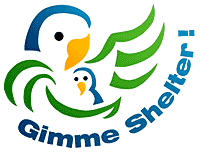 Gimme
Shelter! Gimme
Shelter!
Issue 2: September 2003
Many thanks to all of you who responded to our first
Gimme Shelter! mailing earlier this month with a generous donation
to MAARS! We are continuing this fundraising drive in order to give
you all a chance to help us provide food, veterinary care, toys, and
shelter for the abused, neglected, unwanted, or otherwise displaced
birds awaiting adoption or living in sanctuary at The
Landing.
Top 10 Reasons Birds Are Surrendered to MAARS
Each year, millions of exotic birds are sold into the
pet trade in the United States and abroad. Unlike dogs and cats, however,
parrots are not "domesticated" animals, meaning they have
not evolved over many generations through human or natural selection
for traits that make them compatible with a human lifestyle. While their
beauty and intelligence can make them attractive, their natural, wild
behaviors and longevity virtually ensure that an individual bird will
be displaced at least once — if not multiple times — during
his or her lifetime.
Even with the best of intentions, normal parrot behaviors
and human lifestyles are often incompatible over time. The normal landmark
events in people's lives often leave Polly in the lurch. In ascending
order, these are the top ten reasons people surrender their birds to
MAARS:
| 10)
|
Veterinary
Bills: Parrots are expensive to purchase, house,
feed, and entertain, and an expensive health problem is often
enough to break the bank. Behavioral problems such as feather-picking
and self-mutilation can also become expensive, frustrating, and
time-consuming to treat.
|
| 9)
|
Divorce:
The end of a marriage is usually stressful, both emotionally and
financially. In many cases, both parties will move to rented apartments
or to the homes of relatives, which may not allow parrots. The
emotional stress of the situation may make a demanding animal
like a parrot too much to handle.
|
| 8)
|
Death:
Parrots — especially the larger species — can live
50–100 years and can therefore easily outlive their caregivers.
When another family member does not want the bird, MAARS may get
the call. We offer an estate plan for people who wish to provide
for MAARS' care of their birds in their wills.
|
| 7)
|
Too
Many Birds: Because there are so many species
and mutations available, some people find it tempting to "collect"
parrots and other birds. Breeders can also get in over their heads
very quickly when they produce more babies than they can sell,
or the birds they have sold are returned to them for one of the
reasons on this list. Some well-intentioned, but ill-equipped
individuals attempt to take in unwanted birds, but turn into hoarders
who can't care for all of their animals. MAARS takes in birds
both from individuals who surrender them willingly or from situations
where birds are confiscated by law enforcement agencies.
|
| 6)
|
Retirement:
People's lives can change dramatically when they retire, and a
demanding parrot can get in the way of plans to travel, volunteer,
or spend more time with grandchildren.
|
| 5)
|
Illness
or Allergies: The presence of a bird in the home
can easily become too much to bear when a person is suffering
from a long-term illness and doesn't have the energy to provide
proper care. When the bird is actually the cause of the illness,
as in the case of allergies or some other medical conditions,
then there is often little else that can be done short of removing
the bird from the home.
|
| 4)
|
Bird
is Aggressive or Loud: Parrots evolved to live
in large flocks and use their voices to communicate with mates,
offspring, and other flock members over great distances. They
are also incredibly intelligent, pair-oriented animals who can
become dangerously aggressive when they feel their mates or territories
are being threatened. As prey animals, they have no other option
than to fight back when they feel cornered and cannot escape —
such as when they are trapped by the inability to fly caused by
the clipping of wing feathers to "tame" the bird. Unfortunately,
most people don't do enough research on the true
nature of parrots before they bring one home and may not be
able to tolerate a bird's natural or stress-induced vocalizations
or behaviors.
|
| 3)
|
Moving:
Moving to a new home can be confusing, frustrating, and tiring,
and many people don't want the added hassle of caring for a demanding
parrot during this time. In addition, many people can't —
or simply won't — limit their rental housing search to buildings
that allow parrots. In these cases, the human family gets a new
home, but the bird is left homeless.
|
| 2)
|
Bird
Doesn't Like a Family Member, or Vice Versa: As
an intelligent animal who is programmed to live in a monogamous,
bonded pair within the structure of an extended flock, a parrot
can become highly possessive of one family member and highly aggressive
toward others that he/she feels may threaten this bond. When a
new boyfriend, girlfriend, spouse, child, elderly parent, roommate,
pet, or other resident moves into a home with a parrot, the bird's
behavior and care demands may become intolerable. In addition,
some people simply do not like living with parrots and many parrot
caretakers will choose to give up the bird for the sake of the
human relationship.
|
| 1)
|
New
Baby: The birth or adoption of a new human baby
is a highly stressful time under the best of circumstances. Since
caring for a parrot properly is time-consuming and expensive —
the equivalent of caring for a "special needs" child
— it is often too much stress for a couple or individual
to bear when an even more demanding being enters their lives.
If the parrot also reacts aggressively or self-destructively to
the addition to the family, then it is almost certainly doomed
to being displaced.
|
MAARS Needs Your Help NOW!
Since the spring of 1999, MAARS has cared for approximately
1,200 birds and currently takes in an average of more than one bird
each day, many of whom have never been out of their cages. Sixty Volunteer
staff working twelve shifts per week tend to the daily needs of approximately
240 birds at our Minneapolis/St. Paul area facility, The
Landing, providing safe, clean housing, veterinary care, a nutritious
diet, and environmental enrichment. On average, it costs MAARS $1.00
per bird per day to meet these basic care requirements and run the organization.
You Can Help Birds Like…
| 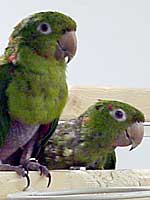
|
Evita & Miguel
Evita & Miguel are wild-caught Cuban Conures.
They were transported to The Landing by a MAARS Volunteer in May
2002. When they arrived, both of them were in very poor feather
— most likely the result of a nutritionally insufficient
diet. They had also spent many years in small cages and were not
physically strong. The decision was made to keep Evita & Miguel
at The Landing until their health and strength improved. [More…]
|
| 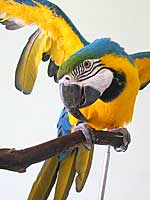
|
Cosmo
Cosmo is a four-year-old Blue and Gold Macaw who
arrived at The Landing in June 2003 missing most of his feathers.
He had been destroying his feathers by chewing through the shaft
close to the skin since he was less than a year old. He had no
tail, no flight feathers, and only a few feathers on his back,
breast, abdomen, and legs. We have worked with many, many featherless
birds and had little hope that Cosmo would ever recover from this
behavior. [More…]
|
| 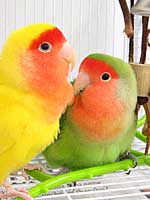
|
Mom & Dad
Mom & Dad are a bonded pair of Peach-faced Lovebirds
who arrived at The Landing in March 2002 after a rural Minnesota
humane society placed an emergency phone call to MAARS. Mom & Dad had been adopted through the humane society and were returned
with two chicks in their nestbox! Mom & Dad were doing a fine
job of raising their chicks — and were fiercely protective
of them — but the humane society was concerned that the
chicks would not thrive without knowledgeable care. [More…]
|
| 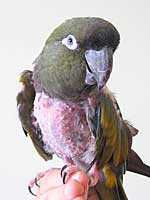
|
Budd
Budd, a Patagonian Conure, was surrendered to MAARS
in June 2002 when his guardian of ten years, a career military
man, was being frequently relocated out of state and overseas
in the aftermath of 9/11 and the war in Afghanistan. Budd had
spent many months with his guardian's mother prior to coming to
MAARS and had relapsed into feather-picking behaviors during this
time. [More…]
|
Join the MAARS Flock Today…and Be the Wind Beneath
Their Wings!
The MAARS Annual Membership Program gives you and our other loyal MAARS Supporting Flock Members the opportunity to help MAARS on an ongoing, sustaining
basis. Your annual financial contribution will allow us to continue
to provide and expand our valuable rescue, intake, care, veterinary and behavioral
evaluation and treatment, adoption, sanctuary, outreach, and educational
services for the displaced captive
birds who we meet and the
people whose lives they touch.
With so little, you can do so much to change the lives
of birds like Evita & Miguel, Cosmo,
Mom & Dad, and Budd.
On average, it takes $1.00 per day to care for each MAARS bird. Every
small donation makes a big difference, and big donations help even more.
Your participation in the MAARS Annual Membership Program will help save and improve the lives of hundreds of parrots
and other displaced captive birds.
Join MAARS today! Give them shelter! Ease their pain!
Stop the cycle! And know that you made one corner of the world
a better place for another living creature!
Mail Your Membership Donation
Mail a check or money order made out to "MAARS"
to: MAARS, 1360 University Ave W #347, St. Paul, MN 55104.
Join Securely Online
MAARS accepts Visa, MasterCard, American Express, Discover,
checks, money orders, and PayPal
through our online MAARStore.





Click here for
more information on the MAARS Annual Membership Program!
Midwest Avian Adoption &
Rescue Services, Inc., is recognized by the IRS as a 501(c)(3) non-profit
organization (Federal ID# 41-1944074) and is registered with the Office
of the Secretary of State and the Office of the Attorney General of
Minnesota as a charitable organization. All donations are tax-deductible
to the fullest extent allowed by law.
|
|